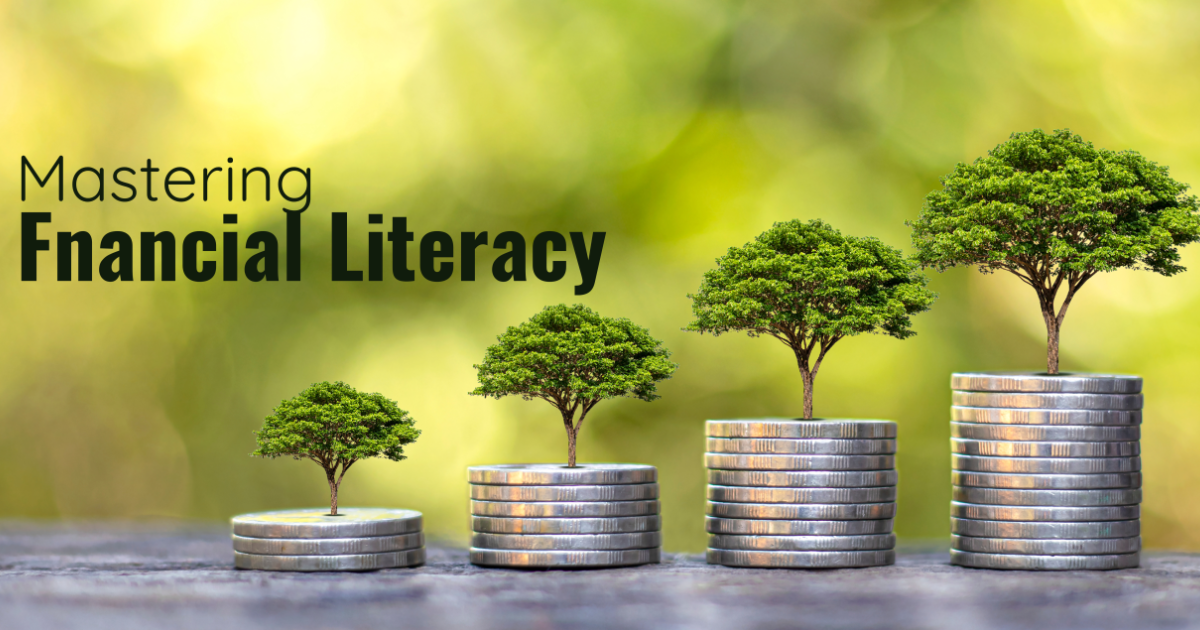Essential Financial Literacy Financial literacy is the foundation of a secure and prosperous life. It’s more than just understanding numbers — it’s about making smart decisions with your money to achieve your goals and handle life’s financial ups and downs. Whether you’re just starting out or looking to refine your money skills, mastering financial literacy is essential for everyday life.
In this article, we will explore key concepts of financial literacy, practical tips to manage money effectively, and how to build a strong financial future.
What Is Financial Literacy?

Understanding Financial Literacy
Financial literacy is the ability to understand and effectively use various financial skills, including personal financial management, budgeting, investing, and borrowing. It equips individuals to make informed decisions about their money.
Why Is Financial Literacy Important?
- Control Over Finances: Helps you manage income, expenses, and savings wisely.
- Avoid Debt Traps: Understanding credit and loans can prevent harmful debt cycles.
- Plan for the Future: Enables effective retirement, education, and emergency planning.
- Confidence: Boosts confidence in making financial decisions and reduces money-related stress.
Core Concepts of Financial Literacy
Budgeting and Money Management
Creating a Budget That Works
A budget is a plan for your money. It helps you track how much you earn, spend, and save.
- List all sources of income.
- Track fixed expenses (rent, utilities) and variable expenses (food, entertainment).
- Set realistic spending limits.
- Review and adjust monthly.
Benefits of Budgeting
- Prevents overspending.
- Helps identify unnecessary expenses.
- Increases savings.
- Prepares you for emergencies.
Saving and Emergency Funds
The Importance of Saving
Saving is setting aside a portion of your income for future use. It provides financial security and peace of mind.
- Aim to save at least 20% of your income.
- Use separate accounts for savings.
- Automate savings where possible.
Building an Emergency Fund
An emergency fund is a financial safety net for unexpected expenses like medical bills or car repairs.
- Aim for 3 to 6 months of living expenses.
- Keep funds accessible but separate from daily spending money.
Understanding Credit and Debt
What Is Credit?

Credit is borrowing money with a promise to repay it later, often with interest. Examples include credit cards, loans, and mortgages.
Managing Credit Responsibly
- Use credit cards wisely; avoid maxing out limits.
- Pay bills on time to build a positive credit history.
- Monitor your credit score regularly.
The Risks of Debt
Debt can be useful but also risky if not managed properly. High-interest debt can accumulate quickly and damage your financial health.
- Prioritize paying off high-interest debts first.
- Avoid unnecessary borrowing.
- Seek professional advice if overwhelmed.
Investing for Growth
Basics of Investing
Investing involves putting money into assets (stocks, bonds, real estate) to grow wealth over time.
- Understand different investment options.
- Consider your risk tolerance and time horizon.
- Diversify investments to reduce risk.
Benefits of Early Investing
- Compounding returns can grow wealth exponentially.
- Early investments allow time to recover from market fluctuations.
Practical Tips to Master Your Money
Track Every Dollar
Keeping a detailed record of your spending can reveal habits and help control impulses.
Set Financial Goals
Define clear, achievable financial goals like buying a home, education, or retirement savings.
Use Technology Tools
Apps and online tools can help automate budgeting, saving, and investing.
Educate Yourself Continuously
Financial literacy is an ongoing journey. Read books, attend workshops, and follow trusted finance blogs.
Overcoming Common Financial Challenges
Dealing With Unexpected Expenses
- Maintain your emergency fund.
- Avoid using credit cards for emergencies unless necessary.
- Consider insurance options for health, home, and auto.
Avoiding Lifestyle Inflation
As income increases, resist the urge to spend more on non-essential items.
Managing Financial Stress
- Create a realistic plan.
- Communicate openly with family or advisors.
- Practice mindfulness and stress-relief techniques.
Building a Long-Term Financial Plan

Retirement Planning
Start saving for retirement early. Utilize employer-sponsored plans like 401(k)s or IRAs.
Insurance Protection
Adequate insurance safeguards your assets and income.
Estate Planning
Prepare wills and power of attorney documents to protect your loved ones.
Also Read : Top Investment Strategies For Long Term Financial Growth
Conclusion
Mastering money through essential financial literacy skills is a powerful tool that impacts every aspect of your life. By understanding budgeting, saving, credit, debt management, and investing, you build a strong foundation for financial security and independence. The key is to start early, stay consistent, and continuously educate yourself.
Financial literacy isn’t just about money—it’s about freedom, peace of mind, and the ability to make your dreams a reality.
Frequently Asked Questions (FAQs)
What is the first step to becoming financially literate?
Start by tracking your income and expenses to understand your cash flow. Then create a realistic budget and set clear financial goals.
How much should I save each month?
A good rule of thumb is to save at least 20% of your income, but start with what you can and increase it gradually.
How can I improve my credit score?
Pay your bills on time, keep your credit utilization low (under 30%), avoid opening too many new accounts, and regularly check your credit report for errors.
Is investing risky for beginners?
All investments carry some risk, but with proper knowledge, diversification, and a long-term perspective, investing can be a smart way to grow wealth.
What if I have debt already?
Focus on paying down high-interest debt first, avoid accumulating more debt, and consider consulting a financial advisor or credit counselor for help.





